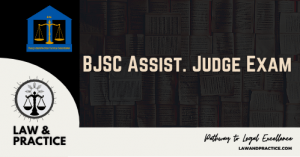
Bangladesh Judicial Service Commission (BJSC) is responsible for assessing candidates for appointments at the entry-level of the Bangladesh Judicial Service by conducting examinations. The entry-level post at the Judicial Service is Assistant Judge/Judicial Magistrate. A person may apply for the post if s/he is:
(i) a citizen of Bangladesh;
(ii) obtained LL.B degree with 2nd class or LL.M. degree with 2nd class from any recognized university; and
(iii) having the age not exceeding 30 years.
The assessment is primarily a process of examination in three stages.
-
Preliminary examination: The candidates must sit for a 100 marks MCQ-type examination and secure at least 55 marks to sit for written examination.
-
Written examination: The candidates who passed the preliminary examination will sit for 1000 marks written examination.
-
Viva: The candidates who secured the required score in the written examination will face the viva examination.
Please note that the Syllabus and Marks Distribution have been updated. For the latest, please follow/click the link below:
Updated Syllabus and Marks Distribution (from 2019)
Compulsory General Subjects
Total 400 of 1000 Marks
|
1.
|
General Bengali
|
100
|
2.
|
General English
|
100
|
3.
|
Bangladesh and International Affairs
|
100
|
4.
|
Math and Science
|
100
|
|
400
|
Compulsory Law Subjects
Total 400 of 1000 Marks
|
1.
|
Laws related to Civil matters –.
|
100
|
2.
|
Laws related to Criminal matters –.
|
100
|
3.
|
Laws related to Family matters –.
-
Muslim Law *70 marks
-
Hindu Law *30 marks
|
100
|
4.
|
Constitutional Law and Interpretation of Statute –.
-
-
Interpretation of Statutes *20 marks
-
|
100
|
|
400
|
Optional Law Subjects
Any Two from the list
Total 200 of 1000 Marks
|
1.
|
Civil Courts, Court Fee and Valuation of Suits, Limitation, Stamps and Recovery of Public Demands: –.
Part A:
Part B:
|
2.
|
Transfer of Immoveable, Moveable and Intellectual Properties, Laws related to Registration and Reservations –.
Part A:
Part B:
Part C:
|
3.
|
Laws related to Acquisition of Land, Vested and Immovable Properties –.
Part A: *50 marks
Part B: *50 marks
|
4.
|
Commercial and Industry Laws –.
Part A:
Part B:
|
5.
|
Tort and Contract Laws –.
Part A: *60 marks
Part B: *40 marks
|
6.
|
Alternative Dispute Resolution and Legal Aid –.
Part A: *80 marks
-
Concept and Theories of ADR
-
Modes of ADR
-
ADR Mechanism in the Code of Civil Procedure 1908
-
ADR Mechanism in the Family Laws Ordinance 1961
-
ADR Mechanism in the Family Courts Ordinance 1985
-
-
ADR Mechanism in the Artha Rin Adalat Ain 2003
-
ADR Mechanism in the Gram Adalat Ain 2006
-
ADR Mechanism in the Conciliation of Dispute (Municipal) Board Act 2004
Part B: *20 marks
-
Legal Aid in the Code of Civil Procedure 1908
-
-
Legal Aid Rules 2001
|




